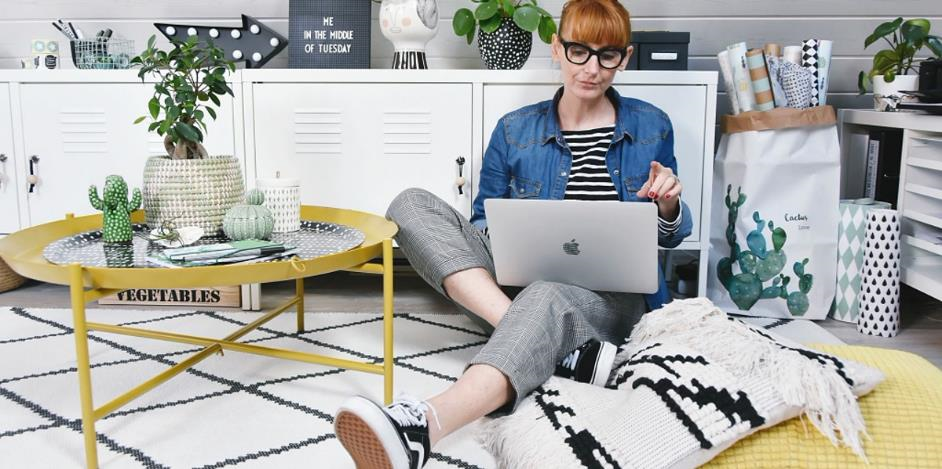Home office: leisure and work at the same place – how does that work?
It may sound contradictory at first – you are in a home office and have all the freedom you always wanted, but didn’t have in an office job. But for many, this does not lead to less work, but to significantly more work. This is simply because you suddenly feel that you are always at work. It is no longer so easy to clear one’s head, break regulations are no longer adhered to and the chat with colleagues between the door and the rod is no longer possible.

This can quickly lead to a higher stress load – despite or because of the new situation. We have briefly summarized some ideas on how to separate work and everyday working life, even though both take place within one’s own four walls.
1. create a fixed schedule
It is also important to introduce regulated working hours in the home office. Of course, you can do more or less – as in the usual everyday working life. But it is important to have a fixed basic structure. Specify exactly when work should usually begin, when you plan breaks and when work ends. In addition to Excel, Outlook and your calendar, useful tools for work scheduling and precise time recording include Monitask, Toggl and Trigger.
2. different accounts on the PC
If you work on the same PC and with the same user account that you use for private purposes, it is difficult to separate work and private life. It is therefore advisable to create separate accounts for your Windows access, browser session and other tools in addition to your e-mail account. This way, you will already log in with your work account when it comes to work and actively switch to your private account when you have free time or want to enjoy extensive breaks. In this way, you avoid playing roulette or watching YouTube videos in your company account in between, but instead pursue such activities only in your private account.
3. recovery times are important – keep to them
The break in everyday working life is not harassment, but an important part of clearing your head and taking time for eating. You should also keep this in mind in your home office. When you take a break, take a break! If you have a short e-mail in between, a short answer to a call or a quick look up, you should consistently refrain from doing so and take a break during working hours. When you take a break, celebrate the break as such. Otherwise it will not have the desired effect. You can read more about how important breaks are for performance in the Career Bible.
4. create – if possible – your own workplace
The term home office can be taken quite literally. If you have the possibility to set up a separate area or even a separate room for work, which you only visit when you really work, this is ideal. This is an excellent way to separate work and private life even within your own four walls.

5. avoid distraction
Many people think it is an advantage to be able to watch a film, chat or play games in addition to work. But this should be avoided at all costs. Distraction not only reduces your ability to concentrate, but also makes you less productive. In the long run this leads to the fact that you have to work much longer than you would have to if you were fully concentrated. At the same time, leisure activities such as watching a film or playing computer games can no longer be appreciated as relaxation. They take place on the side and therefore do not bring the desired recreational effect. Doing both at the same time therefore has a negative effect on leisure activities as well as on performance and efficiency.
6. stay flexible!
Despite all the structure, fixed working hours, the observance of breaks and closing time, you should not neglect flexibility, because that is exactly what the home office is all about in the end. If you feel exhausted, would like to take a short break to look after your child or partner, then you should do so. This not only provides relaxation, but is also exactly what lies behind the idea of flexibility. It is all about using time sensibly. This also includes making good use of your newly gained flexibility and being able to appreciate it.
7. communicate – stay in touch with colleagues
Social contacts should not be neglected in the home office either. Modern communication tools such as Skype, Discord and Teamspeak, which are often found in gamers’ homes, take on a whole new meaning in the home office and can become valuable tools for the working day. They are available for all common platforms and allow you to stay in touch with colleagues and friends while working at home in your newly created workspace. Chatting among colleagues or a short question to your team colleagues remains possible despite spatial separation.
8. keep moving
In particular, all those who had to walk from A to B more frequently in the office or who had to frequently move to the coffee machine, to the archive or to colleagues can quickly suffer from a lack of exercise if they only work from home. It is therefore important to get the necessary exercise at home as well. This not only keeps you healthy and fit, but also ensures that you work more efficiently at the end of the day. Taking a few short steps back, taking a deep breath and stretching your legs is also very important at home. Fitness apps or trackers for the Smartwatch help to remind you of the necessary exercise and not to fall into an 8-hour turtle posture.

Conclusion | Take the term home office literally
Home office does not mean to turn the home into an office, but to set up an office at home
In the end it helps to take the term home office literally and to handle it exactly according to this scheme. It is not home and office at the same time, it is the office at home. This is exactly how you should handle it. Don’t integrate work 100% into your private life, but create opportunities for yourself to integrate your own work area within your own four walls in such a way that work and private life can be meaningfully separated. Only in this way is it possible to switch off effectively, to take breaks and not to take work with you into the break, into the evening and into bed. Rest periods are important in order to maintain performance and not to let the newly gained flexibility degenerate into stress.


